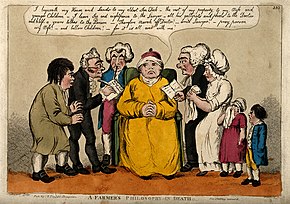
Back Beruf ALS مهنة Arabic مهنه ARZ МугӀалим AV Peşə Azerbaijani حیرفه AZB Propesyon BCL Прафесія Byelorussian Професия Bulgarian Baaraw BM

A profession is a field of work that has been successfully professionalized.[1] It can be defined as a disciplined group of individuals, professionals, who adhere to ethical standards and who hold themselves out as, and are accepted by the public as possessing special knowledge and skills in a widely recognised body of learning derived from research, education and training at a high level, and who are prepared to apply this knowledge and exercise these skills in the interest of others.[2][3]
Professional occupations are founded upon specialized educational training, the purpose of which is to supply disinterested objective counsel and service to others, for a direct and definite compensation, wholly apart from expectation of other business gain.[4] Medieval and early modern tradition recognized only three professions: divinity, medicine, and law,[5][6] which were called the learned professions.[7] In some legal definitions, profession is not a trade[8] nor an industry.[9]
Some professions change slightly in status and power, but their prestige generally remains stable over time, even if the profession begins to have more required study and formal education.[10] Disciplines formalized more recently, such as architecture, now have equally long periods of study associated with them.[11]
Although professions may enjoy relatively high status and public prestige, not all professionals earn high salaries, and even within specific professions there exist significant differences in salary. In law, for example, a corporate defense lawyer working on an hourly basis may earn several times what a prosecutor or public defender earns.
- ^ Perkin, Harold James (2002). The Rise of Professional Society: England Since 1880 (2nd ed.). Routledge. ISBN 9780415301787. OCLC 1378675481.
- ^ "What is a Profession". Australian Council of Professions. 2003. Archived from the original on 1 September 2022. Retrieved 19 February 2020.
- ^ "What is a Profession". Professional Standards Council. Archived from the original on 12 March 2022. Retrieved 9 August 2018.
- ^ New Statesman, 21 April 1917, article by Sidney Webb and Beatrice Webb quoted with approval at paragraph 123 of a report by the UK Competition Commission, dated 8 November 1977, entitled Architects Services[usurped] (in Chapter 7).
- ^ Popat, Nitin (18 February 2016). Introduction to Accounting. Lulu.com. ISBN 9781329911642. Retrieved 10 September 2016.
- ^ Perks, R.W. (1993): Accounting and Society. London: Chapman & Hall; ISBN 0-412-47330-5. p.2.
- ^ See for example:
Fisher, Redwood, ed. (August 1846). "Statistics of the State of New-York". Fisher's National Magazine and Industrial Record. 3 (3): 234. Retrieved 17 August 2013.
[...] the three learned professions of divinity, law, and medicine [...]
- ^ John J Parker, "A Profession Not a Skilled Trade" (1955-1956) 8 South Carolina Law Quarterly 179 HeinOnline Archived 6 August 2020 at the Wayback Machine; Sommerlad, Harris-Short, Vaughan and Young (eds), The Futures of Legal Education and the Legal Profession, Bloomsbury, 2015, p 147; Richard Colman, "Medicine is a profession not a trade" Archived 15 December 2021 at the Wayback Machine, British Medical Journal, 7 October 2001; A M Linz, "A profession, not a trade" (December 1990) New York State Dental Journal 56(10):16 PubMed Archived 16 June 2018 at the Wayback Machine; E. G. Eberle, "The practice of medicine held to be a profession and not a trade" (August 1939) 28 Journal of the American Pharmaceutical Association 482 Wiley Archived 15 December 2021 at the Wayback Machine; Wendler, Tremml and Buecker (eds), Key Aspects of German Business Law: A Practical Manual, 2nd Ed, Springer, 2002, p 255; William F Ryan, "Methods of Achieving Professional Recognition" (1946) The American Engineer, vols 16-17, p 8 [1] [2].
- ^ (1961) 2 The Industrial and Labour Law Digest, 1926-1959, Annotated 668; Sharma and Goyal, Hospital Administration And Human Resource Management, 5th Ed, PHI Learning, p 445.
- ^ Fossum, John; Moore, Michael (December 1975). "The stability of longitudinal and cross-sectional occupational prestige rankings". Journal of Vocational Behavior. 7 (3): 305–311. doi:10.1016/0001-8791(75)90072-X. Archived from the original on 25 April 2022. Retrieved 17 September 2020 – via Elsevier Science Direct.
- ^ Holm, Ivar (2006): Ideas and Beliefs in Architecture and Industrial design: How attitudes, orientations and underlying assumptions shape the built environment. Oslo School of Architecture and Design. ISBN 82-547-0174-1.